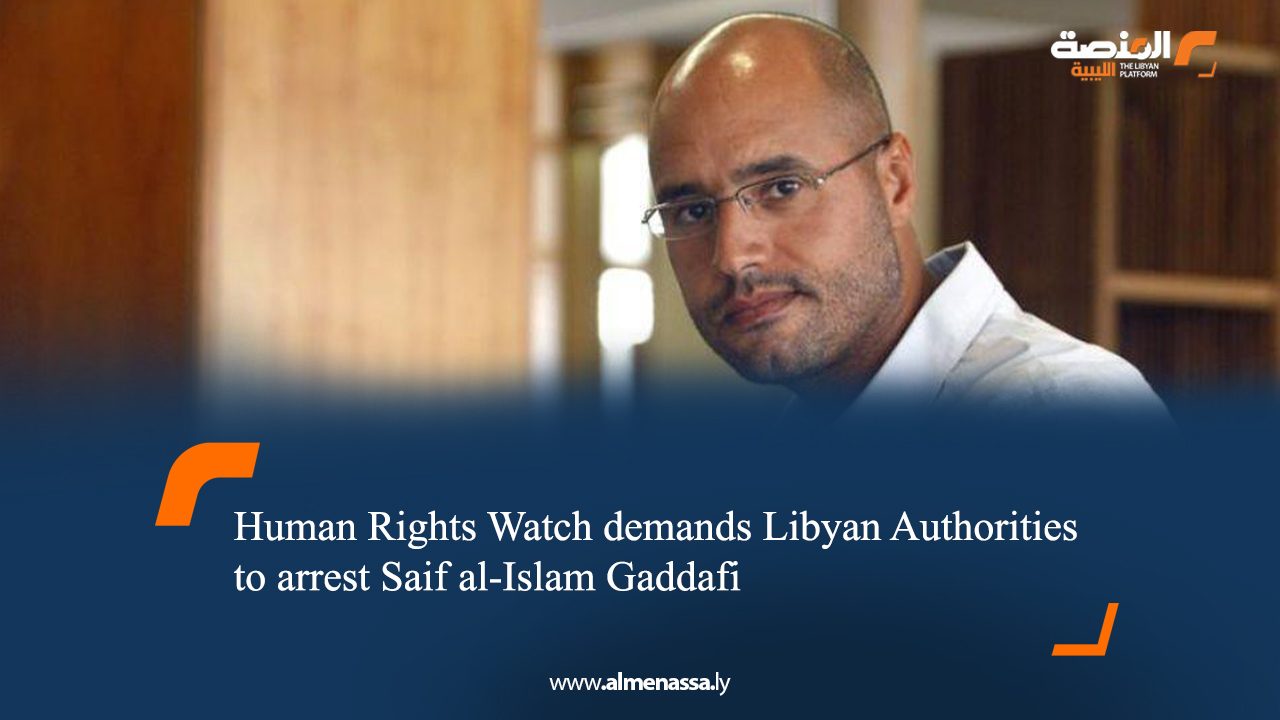Human Rights Watch has directed sharp criticism towards Libya’s justice sector, urging authorities to arrest Saif al-Islam Gaddafi, the son of the late President Muammar Gaddafi, and surrender him to the International Criminal Court (ICC).
In a report released on Monday, the organisation reiterated the case of Saif Gaddafi, in addition to a militiaman in western Libya, stating: “Both are wanted for alleged war crimes and crimes against humanity.” Human Rights Watch believes that “Libya’s judiciary is unwilling and unable to conduct genuine investigations into serious crimes.”
Defenders of Saif Gaddafi expressed their anger at the organisation’s delving into his case, pointing out that Libya “is not a party to the International Criminal Court and has not signed the Rome Statute.” They argued that the Court “overlooks crimes committed against Palestinians and focuses on Libya.”
In this context, Human Rights Watch stressed that “Libyan authorities should cooperate with the ICC and expedite the arrest and surrender of all individuals in Libya subject to ICC arrest warrants, such as Saif al-Islam and Osama Najim (Head of the Judicial Police Department and Head of the Reform and Rehabilitation Institution in Tripoli).”
Human Rights Watch believes that the Libyan justice sector, which it described as “fragmented,” is marred by “serious violations of due process, as well as the existence of laws that violate international standards.” The organisation stated that “the documented violations in Libya, by their scale and persistence, reflect chronic deficiencies in Libyan judicial institutions.”
The organisation concluded on this point that “addressing structural institutional dysfunction, including within the judiciary, is a prerequisite for overcoming impunity.”
For his part, Khaled Al-Ghwail, foreign relations advisor to the “Union of Libyan Tribes,” believes that the ICC “applies double standards.” In an interview with “Asharq Al-Awsat,” he said: “Such reports do not concern us and only express themselves,” adding: “We have a fair and impartial judiciary; it is the only one that decides on the prosecution of Libyans who commit crimes.”
Saif Gaddafi reappears in the spotlight from time to time, either in international reports or in statements by ICC Prosecutor Karim Khan, who has previously spoken about the continued validity of the arrest warrant issued against him. The ICC accuses Saif al-Islam of committing “murder and persecution amounting to crimes against humanity” against civilians during the “February 17 Revolution” in 2011.
On May 12, the ICC announced that the Government of National Unity had accepted the Court’s jurisdiction, under Article 12(3) of the Rome Statute, which allows non-State Parties to voluntarily accept the Court’s jurisdiction within a specified temporal or subject-matter framework. This pertains to crimes within the Court’s jurisdiction committed in Libya between 2011 and 2017.
Al-Ghwail spoke about Saif Gaddafi’s status in Libya, saying: “Those who talk about him being wanted by the International Court know very well that he has become wanted by all Libyans,” adding: “But this is the colonial policy that does not want the independence of our peoples’ decisions.”
Hanan Salah, Associate Director for the Middle East and North Africa division at the organisation, stated that Libyan authorities, “by failing to address chronic needs for judicial reform, are turning their back on justice and allowing impunity to prevail.”
Salah stressed that the recent deadly clashes between militias in the capital, Tripoli, and “the absence of adequate justice mechanisms to address violations and abuses, should serve as a warning of the need for urgent reforms.” The organisation noted that the recent acts of violence and the discovery of a new “mass grave” in Tripoli underscore the need for judicial accountability.”


